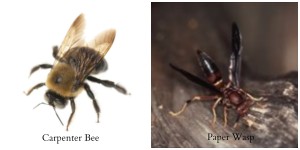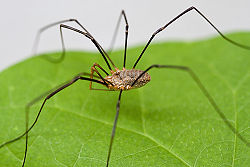READY TO GET STARTED?
REQUEST A FREE ESTIMATE
Fill out the form below or call (888) 466-7849 for a free, no-obligation estimate.
School is back in so inevitably it’s time to have “the talk”. Ya know, the one we dread every year…the talk about LICE! September is Lice Prevention Month but these days, with school starting in August, it’s best to have the conversation early!
Lice, tiny little wingless insects that make their home in human hair, spreads rapidly! On the bright side, although creepy, they do not spread disease and are by most accounts not a danger to our health. However, they are annoying and highly contagious. They can cause itchiness, redness, and even slight inflammation.
Bees and wasps are often confused for one another. Although they both belong to the hymenoptera order and share similar features, they are different. Below is a list of basic shared features, as well as a list of features that set them apart from one another.

Pictures courtesy of NPMA
Bees AND Wasps
Bees
Wasps
For bee and wasp removal, call our team at Northwest Exterminating!
It’s important to protect yourself and your pets from ticks this season! Keep reading for more information on the little suckers!
BRIEF DESCRIPTION
HABITS
SPECIES
THREATS
PREVENTION
OTHER PESTS TO LOOK OUT FOR
Call Northwest Exterminating for information on how to protect your home and loved ones from ticks.
Daddy Long legs or Daddy Long legs Spider?
 Daddy Long legs, or harvestmen, are not actually spiders. Daddy long legs are not poisonous, have long legs and a large bulbous-looking body. They feed on insects, which makes them helpful around the garden. They are especially active at the time of harvest, toward the end of summer and beginning of fall. To keep daddy long legs away, vacuum carpet, upholstery, and curtains frequently to remove spider webs, adult spiders, and egg sacs. Be sure to dispose of the vacuum bag. Tightly seal the trash bag to make sure eggs can’t hatch and crawl out of the bag.
Daddy Long legs, or harvestmen, are not actually spiders. Daddy long legs are not poisonous, have long legs and a large bulbous-looking body. They feed on insects, which makes them helpful around the garden. They are especially active at the time of harvest, toward the end of summer and beginning of fall. To keep daddy long legs away, vacuum carpet, upholstery, and curtains frequently to remove spider webs, adult spiders, and egg sacs. Be sure to dispose of the vacuum bag. Tightly seal the trash bag to make sure eggs can’t hatch and crawl out of the bag.
Tip for preventing daddy long legs: Pour 1 cup white vinegar and 1/3 cup vanilla extract into a spray bottle and shake. Spray areas where the daddy long legs have been spotted indoors and out. The smell will repel the insects.
Daddy Long legs Spiders, or cellar spiders, although venomous, are not known to be harmful to humans. Their fangs are short and they do not have enough muscle to be able to penetrate human skin. Daddy long legs spiders are very fragile and delicate. They are usually brown or gray in color, cylindrical in shape and their legs are very long and thin. Daddy long legs spiders survive on others species of spiders, or on occasion they will invade other spiders’ webs and consume the host, their egg, and any prey caught in the web. They hang upside down on their webs, which they create in dark, damp places like home cellars, caves or abandoned animal burrows.
Tip for preventing daddy long leg spiders: To keep daddy long legs spiders away you will need caulk, a vacuum cleaner, a duster, boric acid/Borax, and spider traps. Caulk cracks in your walls, foundation, and loose window frames. With a vacuum cleaner attachment, suck up spiders and their webs at wall corners, undersides of furniture, floors beneath appliances, crevices along the baseboards and around windows and curtains. Insects attract daddy long legs spiders so dust frequently and repair leaking pipes and faucets both inside and out. Sprinkle boric acid under doorways, around window sills, along baseboards, and under appliances. Boric acid is a common ingredient in household cleaning products and is not harmful to humans and pets. Place spider traps in areas where spiders are usually seen.
Barry Teubert
Northwest Exterminating
Savannah Service Center
bteubert@callnorthwest.com
As a pest control company, Northwest Exterminating makes it a point to provide cleaner living and working environments. Furthermore, we do so by following federal and state guidelines, including the Endangered Species Act of 1973. The Endangered Species Act of 1973 provides legal protection for endangered and threatened species, requiring all federal agencies to ensure their actions do not harm the lives of the endangered. This is important to pest control because the Environmental Protection Agency (EPA) can restrict the use of pesticides that may be threatening. Northwest Exterminating provides itself on not only meeting these standards, but also exceeding them by providing green pest control as an alternative to traditional pest control.
According to the U.S. Fish and Wildlife Service, “Pesticides are useful to society because they are used to control…potential disease-causing organisms, insects, weeds and other pests.” The EPA takes careful measures to ensure that the products used to control pests do not have unreasonable effects on humans or the environment. For instance, this agency regulates the sale and use of ALL pesticides used in the United States. Just as recently as 2008, the EPA began the Pesticide Registration Review Programs to update research on how pesticides may affect endangered species.
Sources:
http://www.fws.gov/contaminants/Issues/Pesticides.cfm
Georgia Pest Control Employee Registration Manual